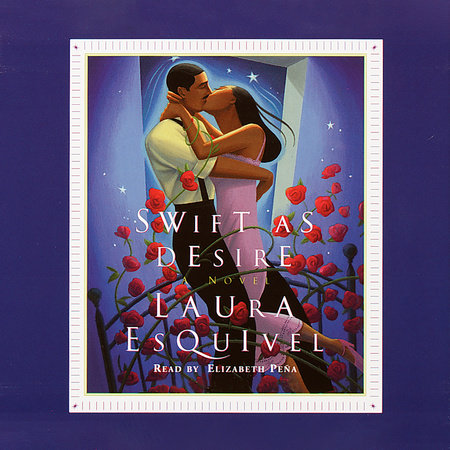Swift as Desire Reader’s Guide
By Laura Esquivel


1. As a child, Júbilo can hear silent words behind the words his mother and grandmother speak, and knows that these silent words represent repressed desires. He considers it his job to translate these repressed desires into a language of emotion. Are these women truly repressing their desire to get along, or is Júbilo projecting his own childish need for them to get along? Since his interpretations cause harmony, does it matter? To what extent do you consider Júbilo’s interpretations meddling?
2. How does Esquivel use the image of Júbilo and Lucha dancing to convey both the power of their love for each other and Júbilo’s sensitivity to currents of energy? Is there any significance to where the dancing scenes are placed in the narrative?
3. There is no concept that disturbs Júbilo more than a message that finds no receiver and languishes without a response. He feels guilty for every unclaimed cosmic signal and devotes his life to acknowledging as many lost messages as possible. What event from his childhood with his Mayan grandmother sparks this obsession? What comment do you think Esquivel is making about modern Mexico’s attitude toward its Mayan heritage?
4. How is Júbilo’s card game with don Pedro a watershed moment in his life? What happens during the game that causes Júbilo to lose his communication with the numbers on the cards, after being in such control? Do you think it is unethical of Júbilo to bet on the boxing championship when he already knows the results, given the objective of the whole evening?
5. How does Esquivel use the sun and rain, and their relationships to electricity, as symbols throughout the book? What is the significance of Lluvia’s nickname? Which characters have a special connection to sunlight—or sunspots—and which have a particular affinity to water? Why?
6. Discuss the significance in the novel of the following statement: “Sometimes good intentions aren’t enough to establish good contact with the cosmos.”
7. Contemplating her father’s situation, Lluvia asks herself: “What was it that my papa didn’t want to see that made him blind? What was it that he was trying to hold in so forcefully that it gave him Parkinson’s disease?” Do you think the mind-body connection is powerful enough to cause these kinds of illnesses? Where else in the novel do you see a link between mental strife and physical ramifications?
8. Do you agree with Lucha that money is necessary to oil the machinery of a happy, loving and productive life? Or with Júbilo, that possessions cause constraint, distorted thinking, and even enslavement? Is this philosophical difference at the root of their marriage’s demise? If not, what is?
9. What does Esquivel mean by “Words travel as swiftly as desire, so it is possible to send a message of love without them”? How does this assertion relate to the fifteen-year silence between Júbilo and Lucha?
10. Why doesn’t Júbilo, who can sense the subtle energy waves of every living thing and can communicate with stars, notice his son’s struggle with death right in the next room?
11. The thirteen-year-old Lucha is described as “unconquerable.” Is this title appropriate for her later in life as well? Do you think Lucha appreciates her husband’s unusual gift for translation? What do you make of her approach to dealing with don Pedro? Why do you think she puts up with his indiscretions so resolutely? Is she too harsh with Júbilo after the tragic death of Ramiro?
12. Esquivel writes, “The only things Júbilo knew how to do were communicate with people and love Lucia. He didn’t know how to do anything else, nor did he want to.” What forces get in the way of these simple goals? Why are “production, industry and technology” named as his foes? Are Júbilo’s aspirations outdated compared to Lucha’s?
Just for joining you’ll get personalized recommendations on your dashboard daily and features only for members.
Find Out More Join Now Sign In